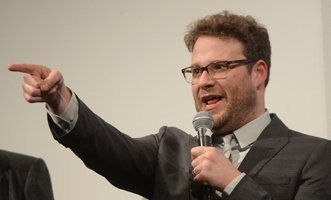More than 5 million Americans suffer from Alzheimer’s disease today, making it the most common form of dementia – 47% say it attracts less financial support than other diseases because it generally affects older people. 51% of Americans who know someone with the disease agree.
Currently, Alzheimer’s lags behind other diseases in terms of research spending. In 2012, funding for Alzheimer's from the National Institutes of Health was around $450m annually, compared to $3bn on research into AIDS, $4.3bn on heart disease, and $5.8bn for cancer, according to the US Alzheimer’s Association.
44% of people who do know an Alzheimer’s sufferer and 39% of people who don’t know one say the reason is because there is a perception that people accept the disease as a natural part of growing old. 28% of Americans – regardless of whether or not they know a sufferer – say it is because it is difficult to imagine the suffering caused by Alzheimer’s without experiencing it first hand.
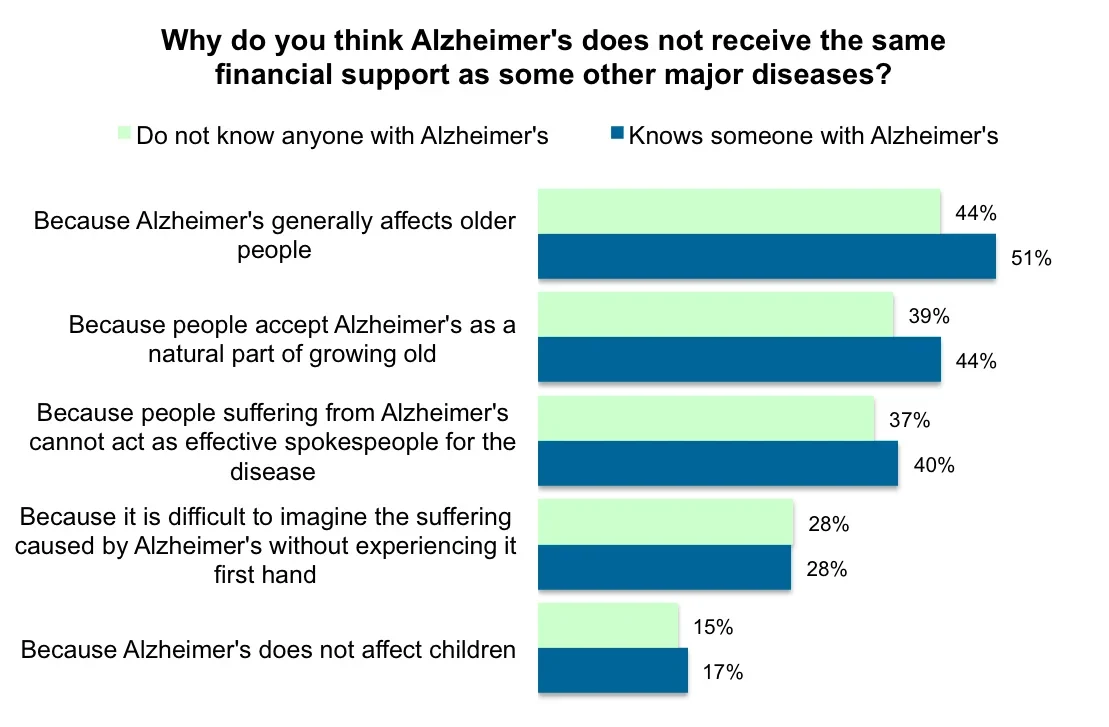
In a recent speech to Congress, actor and comedian Seth Rogen spoke out in support of legislation to increase federal funding for the disease, but only two Senators stayed for him to finish the presentation.
55% of people who know someone with Alzheimer’s say the speech was poorly attended because the disease is not a priority in the US, an opinion held by 39% among people who don’t know a sufferer. That the senators were being disrespectful was chosen as the reason by 38% of people who do know a sufferer, and 29% of people who don’t.
Rogen criticized the “silence that the Alzheimer's community has been facing for decades,” saying that “it needs to be yelled and screamed to the point that it finally gets the attention and the funding that it deserves and needs.” His mother-in-law was diagnosed with early-onset Alzheimer’s, prompting Rogen’s interest in the campaign to increase research funding.
Rogen later tweeted his dissatisfaction at the 16 senators who walked out during his speech, writing: “Not sure why only two senators were at the hearing. Very symbolic of how the Government views Alzheimer's. Seems to be a low priority.”
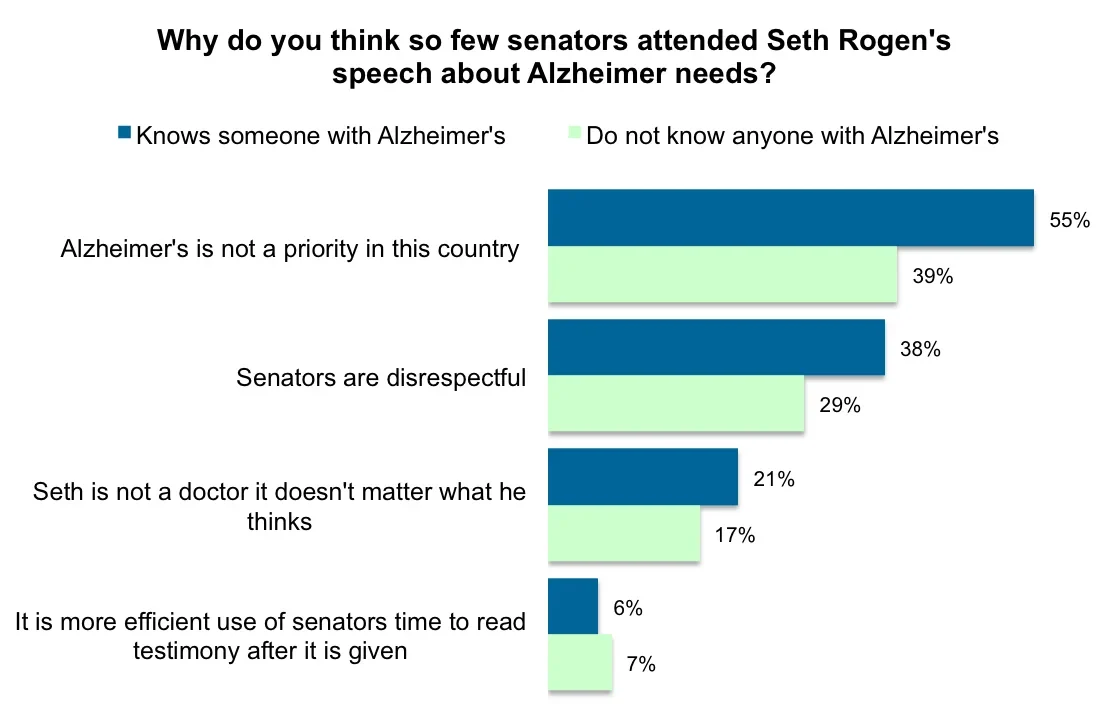
Other respondents indicated that the fact Alzheimer’s patients do not generally vote or contribute to campaigns means senators are less likely to support the campaign. Other responses from YouGov panelists included:
- “There’s no money in it for the senators”
- “People with Alzheimer’s don’t contribute much to campaigns or vote”
- “They’re not taking the situation seriously”
- “Alzheimer’s patients do not donate, vote or defend themselves”
- “There are lots more urgent things going on in the nation at the present time – Libya, Syria, Ukraine”
- “There are so many other things happening in Congress that their time is limited. Government is too large to focus on what is really important.”
- “There is no money to address the need”
- “Lack of respect for the ageing population”
- “They probably thought he was only doing it as a publicity stunt”
- “Senators go where the money is, and that is not with Alzheimer’s, unfortunately”
- “He was a comedian and they wouldn’t take him seriously.”
Just 24% of the nation had heard about Rogen’s speech, compared with 26% among Americans who know someone with Alzheimer’s. Younger respondents are more likely to have heard of the Knocked Up star’s speech – 34% of 18-34 year olds, compared to 18% among Americans aged 55 and over.
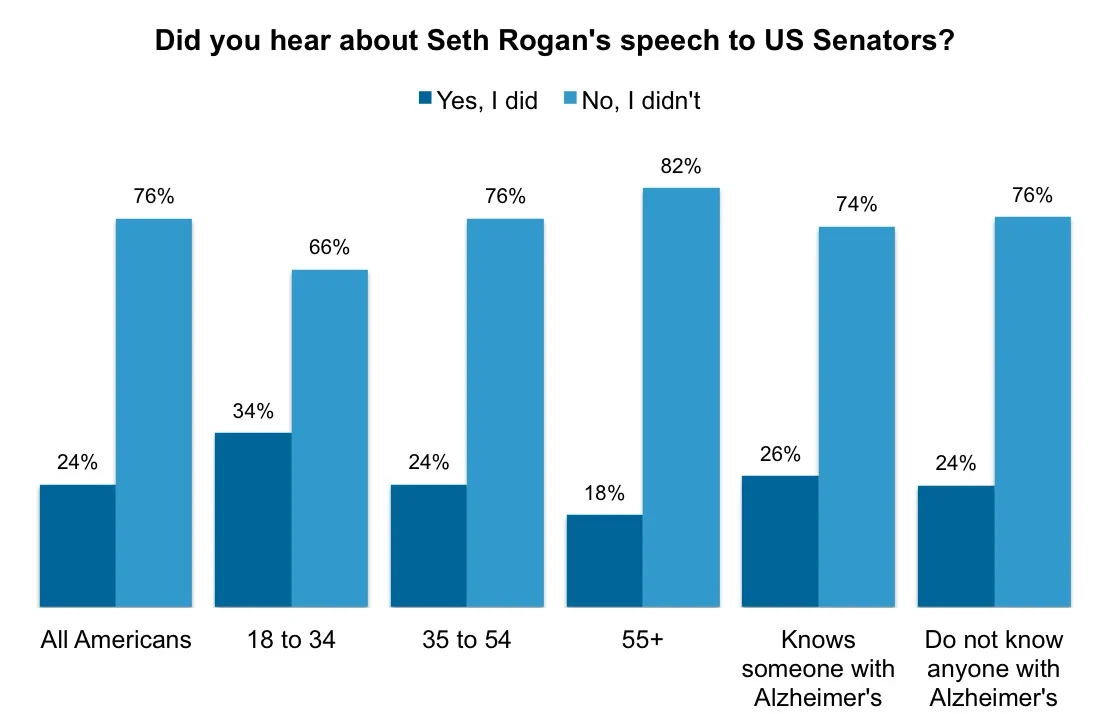
Alzheimer’s generally affects older people, including an estimated 5 million people aged over 64 and approximately 200,000 individuals with ‘younger-onset’ Alzheimer’s at under 65, according to the Alzheimer’s Association. This puts Alzheimer’s disease as the 6th leading cause of death in the US.
Rogen started his speech in a light tone, joking to the Senate Committee Chairman, Tom Harkin: "You told me you never saw Knocked Up, chairman,” but quickly began to explain his experience of knowing someone personally with Alzheimer’s. Older Americans are more likely to know a person suffering from the disease, with 48% among people aged 55 and over saying they know someone with Alzheimer’s, compared to 26% among 18 to 34 year olds and 35 to 54 year olds.
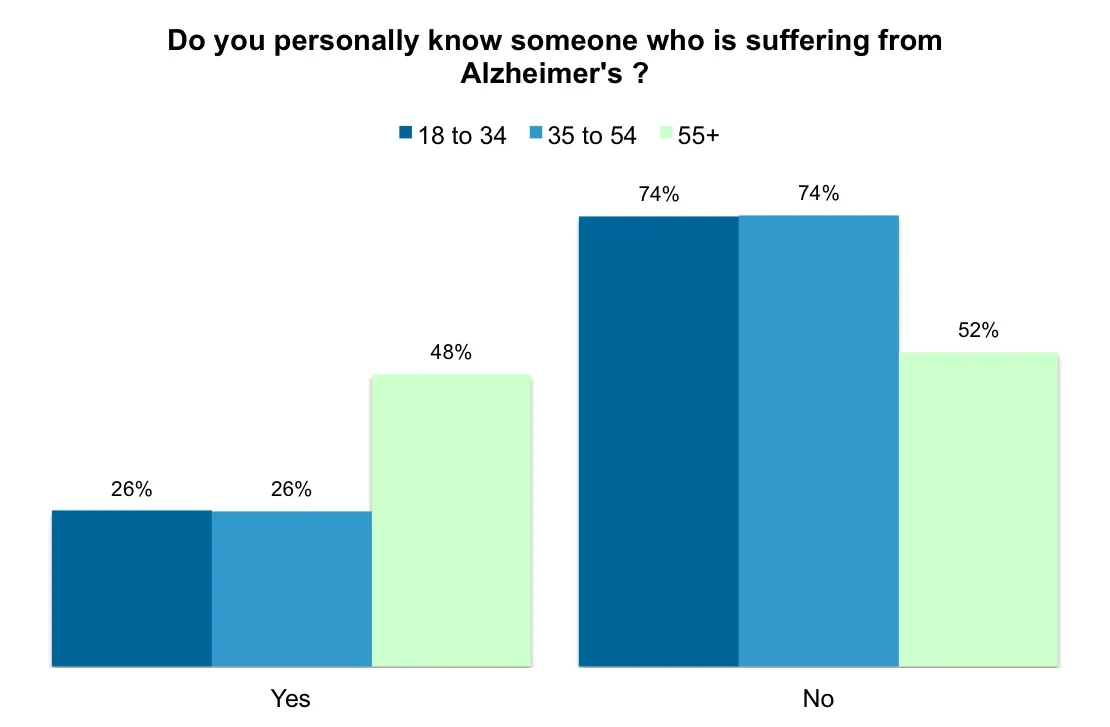
Developing Alzheimer’s is the greatest fear of reaching old age for 14% of the population. 24% of the nation says they do not fear reaching old age at all, while 23% of Americans think not having enough money to live comfortably is their greatest worry as the years advance.
Alzheimer’s is more of a concern among those Americans who personally know someone suffering from the disease. Whereas 11% of people who don’t know anyone with Alzheimer’s said the disease was their greatest fear of growing old, this increased to 18% among Americans who do know someone. People who don’t know an Alzheimer’s sufferer are also more likely to say they don’t fear old age (28% say they have no single greatest fear, compared to 17% among people who do know an Alzheimer’s sufferer).
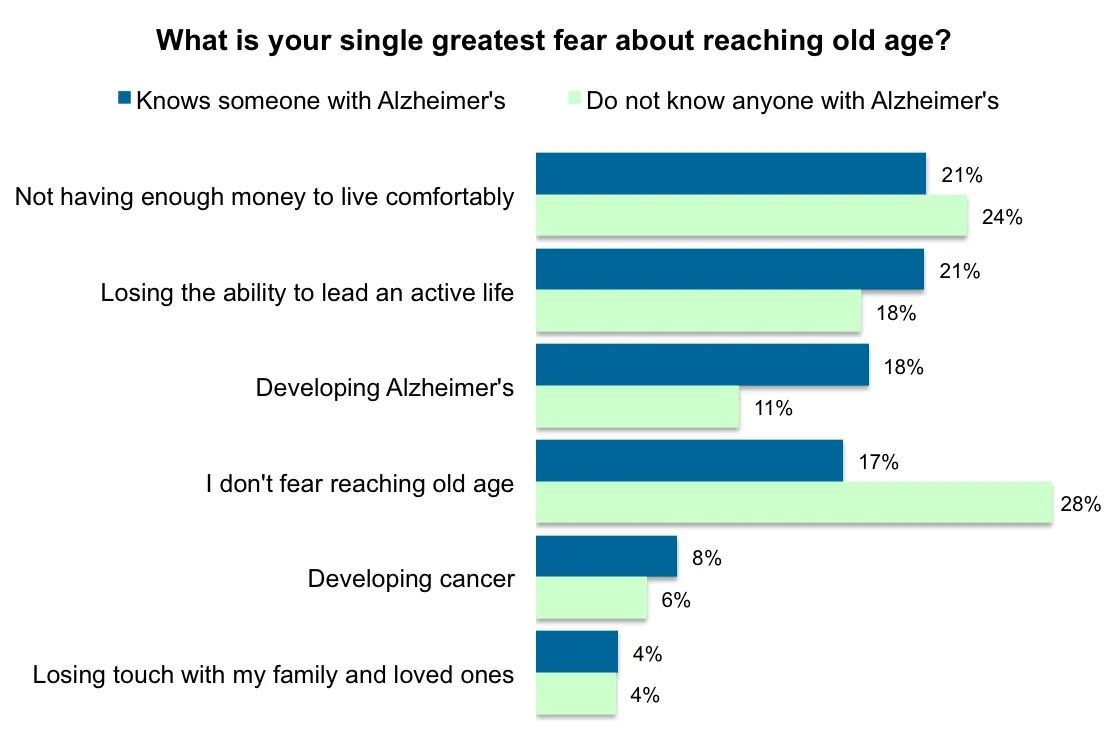
Younger Americans are less likely to fear Alzheimer’s than older Americans, generally having less personal contact with the disease – 13% of 18-34 year olds and 15% of those aged 55 and over say Alzheimer’s is their greatest fear of growing old. Not having enough money is also a more prevalent concern among older Americans (18% of 18-34 year olds and 24% of those aged 55 and over).
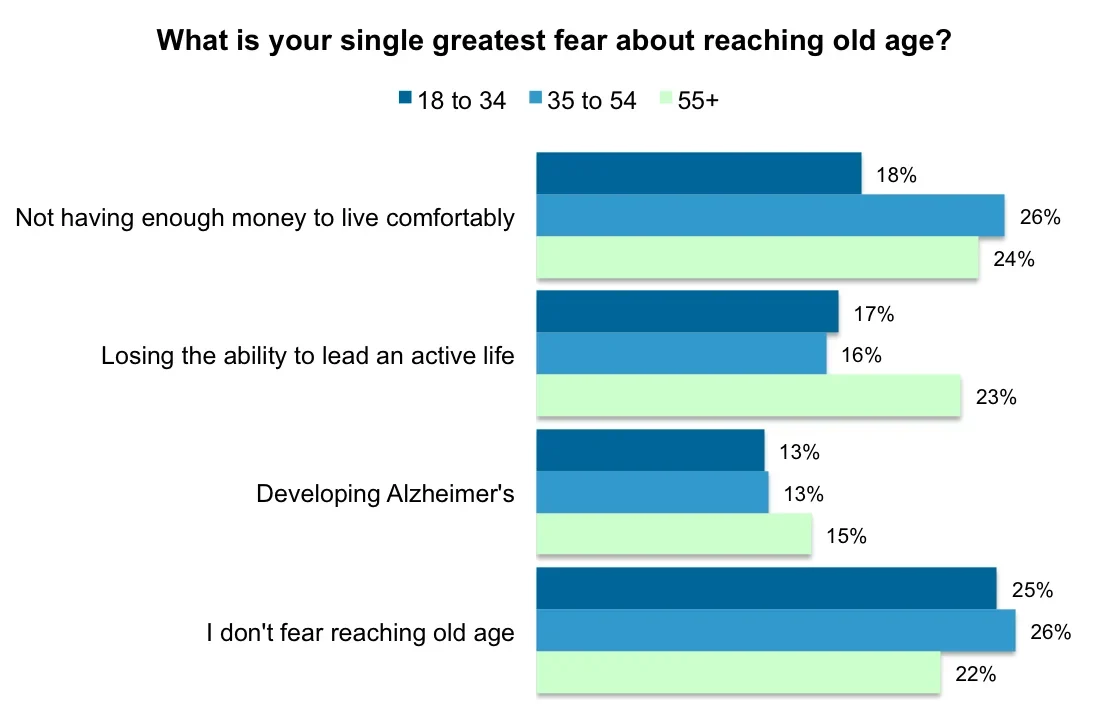
Alzheimer’s leads to a progressive mental deterioration, without a way to prevent, cure or slow its advancement. The hardest aspect of Alzheimer’s is seen as making it difficult for family and friends to see a loved one deteriorate – identified by 26% of people who know someone with Alzheimer’s and 23% of Americans who don’t know someone with Alzheimer’s. Sufferers losing the ability to care for themselves (24% among people who know someone with Alzheimer’s and 20% among people who don’t) and sufferers losing their personality and identity (23% and 24% respectively) were also polled as the worst aspects of the disease.
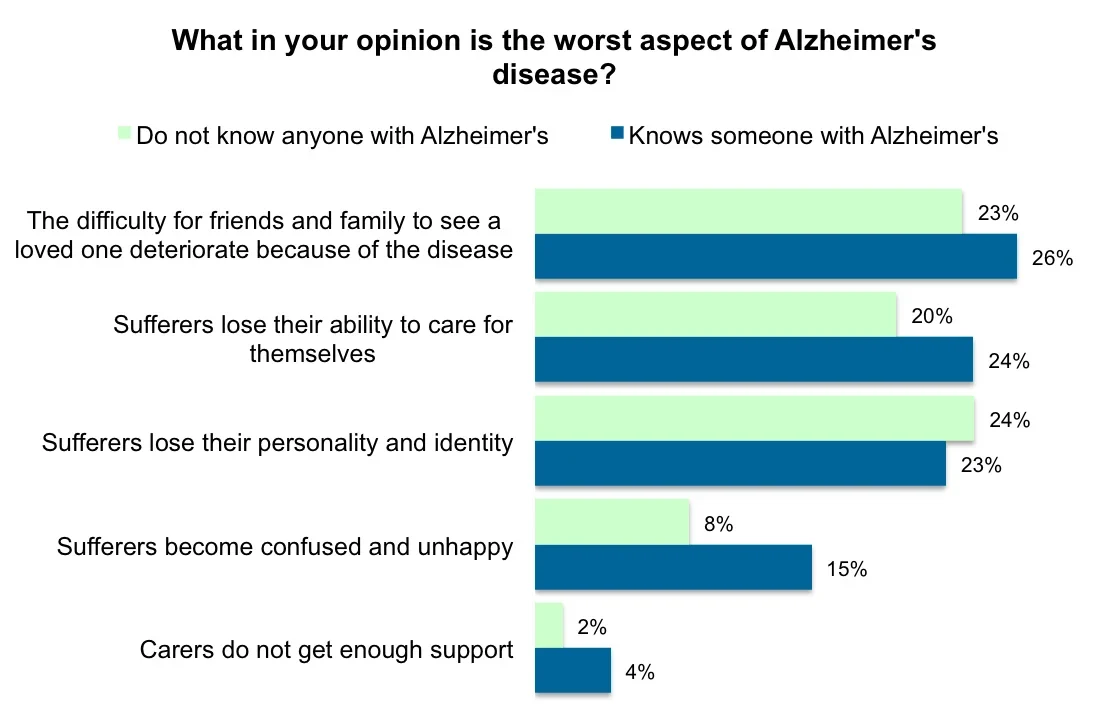
Younger people are more likely to see personality and identity loss as the worst aspect of Alzheimer’s disease – 26% of 18-34 year olds, compared to 21% among those aged 55 and over.
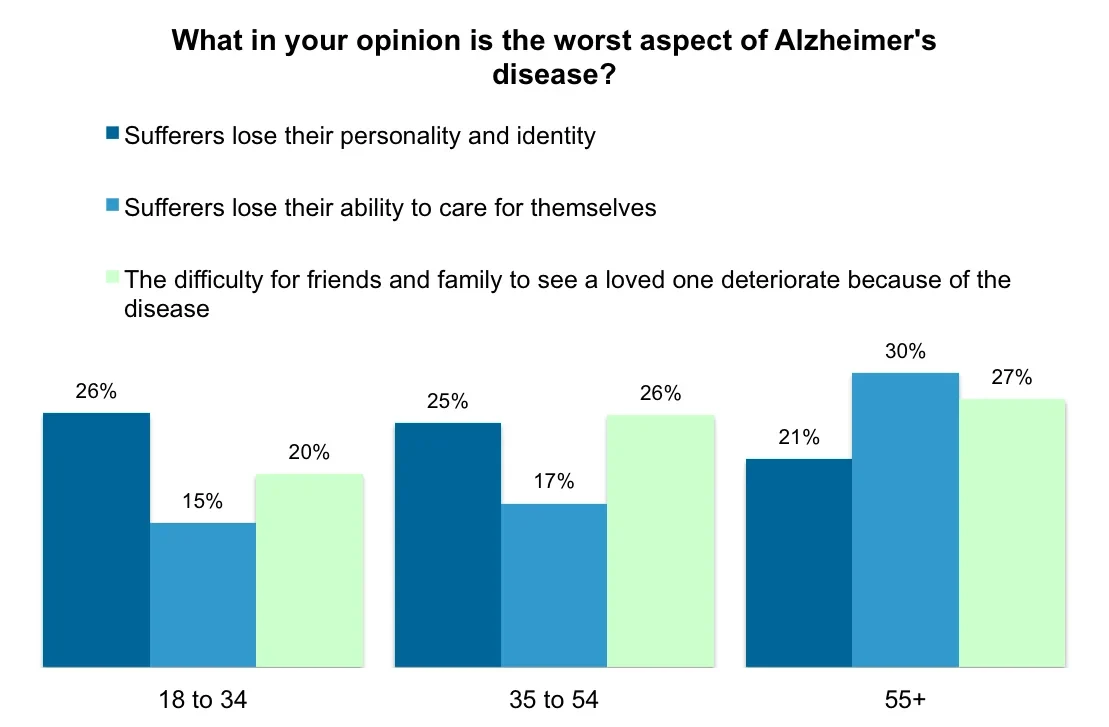
Alzheimer’s is perceived predominantly as a ‘tragic’ disease, according to 64% of Americans who know someone who is suffering. It’s also seen as scary (45%) and untreatable (39%) by people who know an Alzheimer’s patient.
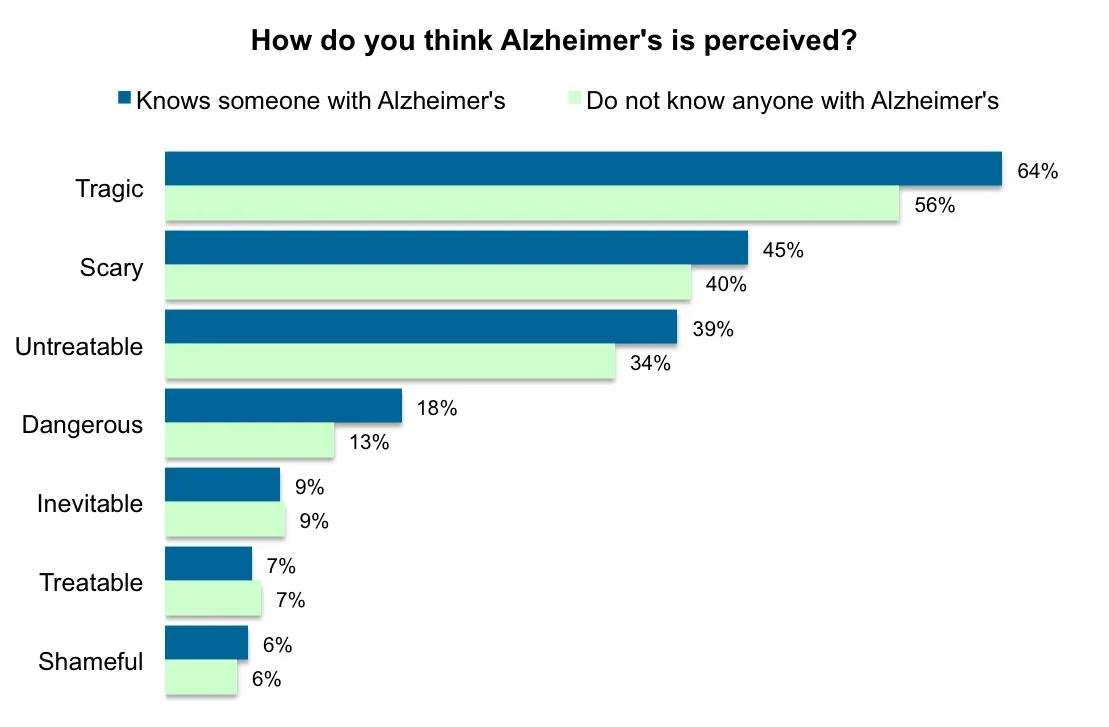
For further information about poll results, and for details about methodology and omnibus services, please email omnibus.us@yougov.com.
Find the full results here.
Image courtesy of Getty.
